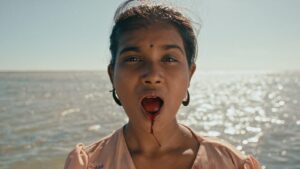Movie Title : When We lost To The Germans
Foreign Film Title:Toen we van de Duitsers verloren
Year: 2023
Country: Netherlands
Language:
In Dutch with English subtitles
Directors:
Guido van Driel
Coming-of-age films can be challenging to watch and even more difficult to review. They often need to strike a delicate balance: tapping into universal emotions that resonate with audiences everywhere while also weaving in deeply personal narratives tied to specific times and places. Typically, we find ourselves connecting more with the universal themes, reflecting our own experiences against the backdrop of the filmmaker’s story. When a film successfully marries these elements, it feels like a rare and perfect alignment.
When We Lost to the Germans is a Dutch film that captures this rare synergy. Contrary to what its title might suggest, the war in question isn’t World War II but the 1974 World Cup finals, when the beloved Dutch team faced off against Germany and ultimately fell short. It was a heartbreaking loss. For many fans, including me and my friends, it symbolized the loss of innocence—the poetic football of Johan Cruyff losing to the brutal efficiency of Franz Beckenbauer’s Germany.
The film takes place the day after the match, in a small town with project buildings, not a picturesque place. It’s summer, many are on holiday and the streets are empty.
Daan, a charismatic, wild kid, comes across Jonas, a shy and timid classmate. Though not friends, they spend the day together, doing little of consequence—wandering the streets, pulling pranks, and experiencing the first hints of sexual awareness. On the surface, nothing unusual happens.
However, through their small talk and a series of flashbacks, a more complex story slowly unfolds. Daan is searching for Karsten, a German boy from their class who happens to be friends with Jonas. Karsten owes Daan money. Meanwhile, Cato, another classmate, has gone missing, and it becomes clear that Jonas had feelings for her. As the day progresses, the kids visit Jonas’s home, Daan’s apartment in the projects, Karsten’s house, and more, gradually revealing what lies behind closed doors. Jonas’s supportive family, Daan’s abusive background, and Cato’s strict Jehovah’s Witness upbringing all contribute to a growing sense of unease that takes hold of the film. The fragile new friendship between Daan and Jonas is tested, leading to a painful conclusion.
Masterfully shot in black and white, the director uses the stillness of the action to draw the viewer in through quiet observation. It is a slow, melancholic film, patiently told and rich in detail.
In the end, I shed a tear.




